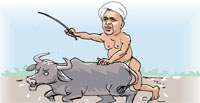| The Sunday Times Economic Analysis By the Economist | ||||||
| |
||||||
Political disputes undermine economic capacity The interesting political aspects of this episode are not the concern of this column. What concerns us is the light it sheds on economic policy formulation and implementation. Political disputes of this nature erode the capacity for implementing economic policies. Treasury officials are not responsible for formulating government policy. They certainly advise the government. It is the government and particularly the cabinet that decides on policy. The minister concerned was a member of the cabinet and as much responsible for the government's policies, as any other. Either the minister did not know what the government's policies were with respect to the fertiliser subsidy or the officials did not act in accordance with government policies that find expression in the allocation of finance in the last budget. A third possibility is that the treasury did not have the money to release for the particular expenditure at the time. Whichever way one looks at the issue, there are fundamental problems that erode the capacity of the government to act. Despite the high talk about the economic recovery, an agricultural strategy policy document, plans for regaining Sri Lanka and the projected high rates of economic growth, there is confusion on whether it is government policy to subsidise fertiliser. The issue dramatised by the Minister of Agriculture is symptomatic of the lack of a clear strategy and polices by the government. What is particularly disconcerting is that vital policies and economic utilisation of resources go untapped. To cite an example from the Agriculture Ministry itself, two of the most important possibilities for increasing paddy production by improved methods of cultivation lie dormant. The Yaya development project of the Department of Agriculture has been halted presumably owing to the lack of funds for it. This project has demonstrated yield increases of 50 per cent or more in a short period. Yet the Department of Agriculture is not implementing this programme. A similar high yielding strategy known as the Madagascar method too has come to a standstill. It is argued that this is not being implemented owing to a technical hitch. But are there resources being allocated to solve these problems and ensure higher yields for paddy? What is happening to hybrid programmes? Are they not vital for the country's development? Human resources that could contribute to the country's economic growth and social development are not harnessed. A glaring instance is what has happened to medical graduates who pass out of our universities. They are not given their internships immediately as in the past. They have to wait about one and a half years before an intern appointment. Is this not a waste of expenditure already incurred and potential gains from education? Are we devoid of any common sense and positive thinking to resolve such a problem? Are we so devoid of resources when all we hear is of money flowing into the country? Planning is out of fashion. Yet the rationale of planning can never be. There is a mistaken view that planning means the preparation of a detailed document giving resource use and targets and government intervention in all activities in the economy. Planning continues to be confused with the socialist model of controlling the commanding heights of the economy. The fact is no country, especially the developing ones, could afford to ignore planning in a broader sense of giving directions, perspectives and priorities. The state has to be involved in supporting agriculture. There is a need to even indicate the resource uses, strategies and objectives, that have to be achieved. One could describe a broad thrust of planning to be one of planning perspectives or perspective plans. Unfortunately the governments of the recent past have failed to give clear ideas of the directions and strategies. Instead they have been content to use slogans. Repeating slogans like " the private sector is the engine of growth", "Structural Adjustment with a Human Face", "Regaining Sri Lanka" and so forth are not likely to achieve results unless detailed programmes are worked out and their implementation ensured. The recent episode illustrates a lack of an agreed plan and strategy in vital areas like agriculture. It also shows a lack of co-ordination among ministers.In short it depicts a poor capacity for effective economic policy implementation. |
||||||
Copyright © 2001 Wijeya Newspapers
Ltd. All rights reserved. |
 A
minister gives his resignation after accusing treasury officials
of not releasing funds for his ministry. The issue is about a fertiliser
subsidy. The Prime Minister does not accept the resignation. That
the resignation was not given to the head of the cabinet, who alone
can accept the resignation, is another matter. She may have accepted
it, had it been given to her. The problem is presumably solved and
the minister is back in his office.
A
minister gives his resignation after accusing treasury officials
of not releasing funds for his ministry. The issue is about a fertiliser
subsidy. The Prime Minister does not accept the resignation. That
the resignation was not given to the head of the cabinet, who alone
can accept the resignation, is another matter. She may have accepted
it, had it been given to her. The problem is presumably solved and
the minister is back in his office.